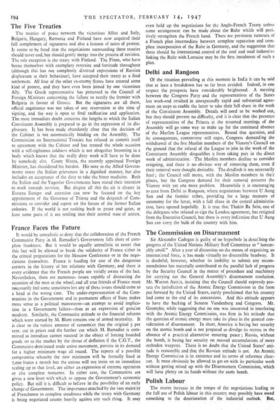The Five Treaties
The treaties of peace between the victorious Allies and Italy, Bulgaria, Hungary, Rumania and Finland have now acquired their full complement of signatures and also a festoon of notes of protest. It seems to be fated that the negotiations surrounding these treaties should never end, but should gently merge into the process of revision. The sole exception is the treaty with Finland. The Finns, who have borne themselves with exemplary restraint and fortitude throughout (although this has not completely diverted expressions of Russian displeasure at their behaviour), have accepted their treaty as a final settlement. All four of the other ex-enemy States have entered some kind of protest, and they have even been joined by one victorious Ally. The Greek representative has protested to the Council of Foreign Ministers concerning the failure to rectify the frontier with Bulgaria in favour of Greece. But the signatures are all there, official cognisance was not taken of any reservation at .the time of signing, and the way is open to final ratification and application. The most immediate doubt concerns the lengths to which the Italian Constituent Assembly is prepared to go in the expression of its dis- pleasure. It has been made abundantly clear that the decision of the Cabinet is not automatically binding on the Assembly. The Commission on International Treaties has refused to commit itself to agreement with the Cabinet and has treated the whole occasion with a self-righteous coldness which is not altogether becoming in a body which knows that the really dirty work will have to be done by somebody else. Count Sforza, the recently appointed Foreign Minister, has shouldered his burden. His note to the Allied Govern- ments states the Italian grievances in a dignified manner, but also includes an acceptance of the duty to take the bitter medicine. Both the Italian and the Yugoslav Governments have stated their intention to work towards revision. But despite all this the air is clearer in Eastern Europe and attention can now be focused on the key appointment of the Governor of Trieste and the despatch of Com- missions to consider and report on the future of the former Italian colonies. If the world is not rushing back to peace and quiet, at least some parts of it are settling into their normal state of unrest.


































 Previous page
Previous page